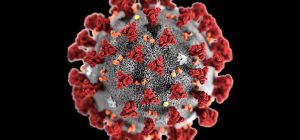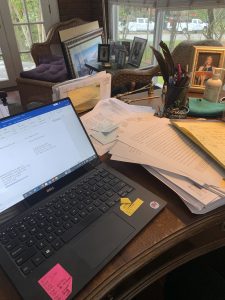Friends:
To say we are experiencing unprecedented times with the global pandemic of Coronavirus-COVID-19 would be a massive understatement. I hope you and your family are well, staying safe and healthy and weathering this storm. I am continuing working on all of my cases to the maximum extent I can at my home. With remote work capability, super high-speed internet and my case management system “in the Cloud,” I can work on any case from any location. I want to let you know how our Georgia Civil and Criminal Justice Systems are adapting to this season we find ourselves in and keep you up to date on all things legal in Georgia right now.
First, the Chief Justice of the Georgia Supreme Court Harold Melton has issued a Statewide Judicial Emergency Order through 11:59 a.m April 13, 2020. I believe Chief Justice Melton has shown great leadership with the issuance of this Order and through it, is doing the Court’s part in not spreading the virus in our courtrooms and alleviating much anxiety among litigants and lawyers.
This Order, issued on March 14, 2020, states that Georgia Courts will remain open for all essential functions, e.g., domestic abuse temporary protective orders (TPOs), criminal search warrants, initial appearances by accused persons, juvenile delinquency detention hearings and mental health commitment hearings. It ordered where possible, for all court proceedings to occur by videoconferencing. All deadlines are tolled, extended, suspended or otherwise given relief from, including statutes of limitation. That means if the two year statute of limitations is approaching or occurs during this judicial emergency, the lawsuit does not have to be filed as of the calendar two-year anniversary.
Interestingly, the Emergency Judicial Order addressed any criminal trials that may have been ongoing when the Order was issued, ordering that criminal trials continue for the most part, but leaving it to the total discretion of the trial judge whether to suspend the trial or declare a mistrial. The Order is silent regarding civil trials. This very scenario occurred in Florida in the criminal trial of Florida v. Warner, which was ongoing when the Chief Judge of the Florida criminal courts issued a similar judicial emergency order closing all Florida courts. The prosecutor wished to continue with the trial, the defense did not. The judge inquired of the jurors what their preference was and they actually said they would prefer not to continue to come to the court, even though this trial was, apparently, the only trial going on at the time in the entire courthouse. The judge, ultimately, ruled in favor of the prosecution and kept going with the trial. The jury was not out for long (as you can imagine) before coming back with a conviction on all counts. This was a murder/death penalty case, too.
A friend of mine was also in the middle of a medical malpractice trial when the social distancing edict started and even when some people were voluntarily isolating themselves at home although no judicial emergency had been issued yet. No mistrial was declared, but you can bet that courtroom was the last place many of those jurors wanted to be during the Coronavirus upheaval. I am sure their minds were focused on the reality of homeschooling their kids, or whether they would even have a job after the trial, not the case they were hearing. Should the judge have sua sponte declared a mistrial or granted a motion for mistrial? These sort of decisions rest solely in the discretion of the trial judge and that is a lot of discretion to have. That decision can be overturned on appeal only if there has been abuse of discretion, which is rare. Also, the plaintiff has waited years for his/her case to be decided. It would be extremely emotionally hard, if not outright expensive, to agree to stop the trial he or she has waited so long for and come back at a later time and start all over. Hard decisions all around.
Many courts have clarified how they will continue to operate after the Supreme Court’s emergency order. Judge Christopher Brasher, Chief Judge of the Fulton County Superior Court, had already issued its own Judicial Emergency Order on March 13, 2020 which was essentially the same as the Supreme Court’s Order the next day. Many trial judges have their staff still coming to the courthouse or working remotely from home. Many judges are holding videoconferencing hearings. Some judges, Like Judge David Cannon,County Superior Court, has even made his videoconferencing hearings available for public viewing via Facebook Live. I love this idea and effort because all court proceedings (except juvenile) ar open to the public and this just helps make that happen. Thank you to Judge Cannon for being creative and innovative. Jury trials are suspended. This is smart because can you imagine the potential for the spread of the virus in a jury assembly room of 200 citizens? Most trial judges are working on their case load, reading briefs, issuing Orders, moving cases. This is extremely commendable. The State Court of DeKalb County, in which I often practice, for example, offers instructions to citizens who may have hearings scheduled and what to do if that is the case. Courts are doing their best in what is an unprecedented situation.
Likewise, I am doing my best, too. I am working from home. I have essentially any part of a case file I need via my case management software “in the Cloud.” This is a phenomenal tool. I even have a case management app on my IPhone that I can easily view for those brief moments when I am away from my computer. I have had a couple of settlement checks come in during this stay home period and so I go to my office late at night when I am unlikely to come into contact with many other people to place the checks in my safe. My paralegal, Niki, can file any court pleading from the comfort of her home now that all court filings are electronically completed. This still amazes me, as when I first started practicing law 31 years ago we would hire a courier to take a pleading to court to be filed in person and that courier had better be in the filing line by 4:30 p.m. or your pleading wasn’t going to get filed on time! Those were the days! And I don’t want to go back to them. To the extent we can, we are taking any depositions via ZOOM or other videoconferencing. Some mediators are mediating cases in this manner. We are doing everything we possibly can to work on each client’s case and keep it moving.
No one knows when this “stay home” mandate will be lifted. For all the lives involved, we hope and pray it will be soon. Whenever that time comes, my clients’ cases will be in a position to continue as if there had been no break in the action and will pick up right where we left off. I truly believe if we all try to have and keep a positive attitude, in the end, everything will be okay. “Sometimes you just need to relax and remind yourself you are doing all that you can do and everything is going to turn out just fine.” I hope you and your families are staying healthy and safe during this unprecedented time. If there is one silver lining in this COVID-19 pandemic, is that we are able to spend time with family that we might not otherwise be able to, and surely that is a blessing.
Robin Frazer Clark is a trial lawyer who pursues justice for those who have personal injury claims as a result of being injured in motor vehicle wrecks, trucking wrecks, defective products, defective maintenance of roads, premises safety, medical malpractice and other incidents caused by the negligence of others. Ms. Clark is the 50th President of the State Bar of Georgia, a Past President of Georgia Trial Lawyers Association, a Past President of the Lawyers Club of Atlanta and has practiced law in Georgia for 30 years. She is a member of the International Society of Barristers and of the American Board of Trial Advocates. Mrs. Clark is listed as one of the Top 50 Women Trial Lawyers in Georgia and is a Georgia Super Lawyer.
Robin Frazer Clark ~ Dedicated to the Constitution’s Promise of Justice for All.
 Atlanta Injury Lawyer Blog
Atlanta Injury Lawyer Blog














